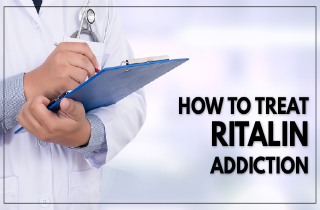Have you noticed signs of Ritalin addiction in someone that you love? Do you know someone with a high methylphenidate addictive potential? Maybe you have an issue with Ritalin yourself. It is important to know what to expect before treating Ritalin addiction so that you can increase likelihood of recovery. Here, we review how to treat Ritalin addiction. Then, we invite you to share your concerns and ask questions about how to withdraw from Ritalin or treat Ritalin addiction at the end.
Ritalin addiction treatment: Are you even addicted?
Ritalin is a common drug among high school and college students who use the drug to keep them alert when studying for exams. But how do you know when non medical use have become abuse or addiction?
One of the primary signs of an addition to any drug, including Ritalin, is making up excuses or reasons to get the drug. When you have an addiction Ritalin, you use Ritalin as a way of coping with life. The feeling that you get from taking Ritalin compels you to obsessive or compulsive use. You may make up fake excuses or use your child as an excuse to get a prescription. Or you may need to consistent increases methylphenidate dosage to achieve desired effect (tolerance). Your body becomes accustomed to methylphenidate over time and requires higher amount to of euphoria associated with Ritalin. Other symptoms may include feeling as though you cannot function without the drug, failing in attempts to stop using Ritalin and making sure you have an adequate supply of the Ritalin at all times.
Treating Ritalin addiction
Treatment Ritalin addiction is continually evolving. Behavioral treatments are the most common approaches for treating an addiction to Ritalin. New pharmaceutical medications are being developed and researched, but are not currently on the market for stimulant withdrawal. The two main ways for treating Ritalin addiction include:
1. Ritalin withdrawal support
While there are currently no medications on the market to address stimulant withdrawal symptoms, medical care and support can help during physical withdrawal. Detoxification from Ritalin can manifest unpleasant side effects as a result of the body withdrawing from methylphenidate. Additionally, detox from high doses of Ritalin can be dangerous or potentially fatal; this is why Ritalin withdrawal support should ALWAYS be completed under the supervision of a physician.
2. Behavioral treatments for Ritalin addiction
Behavioral approaches to addiction an important part of any treatment plan. Behavioral therapy helps Ritalin addicts to increase their ability to handle stressful situations, learn life skills to cope with living a drug free life, learn the triggers that encourage Ritalin cravings and to learn modification exercises that are beneficial for behavior and attitude. There are several subtypes of behavioral therapy that are beneficial for the treatment of Ritalin addiction including (but not limited to):
The Matrix Model – This approach focuses on the use of several combined treatment approaches, such as 12 step programs, drug education and family/individual counseling. The Matrix Model relies on a positive interaction between the therapist and the Ritalin addict.
Contingency Management Interventions/Motivational Incentives – This principle of therapy works by reinforcing Ritalin abstinence with a reward, such as a voucher that can be exchanged for extra privileges.
12-Step Facilitation Therapy – 12-step programs help to promote abstinence by following three key concepts: acceptance, surrender and active involvement in 12-step meetings.
Treatment for Ritalin addiction
If you need treatment for a Ritalin addiction there are several places to seek help. You can find treatment for Ritalin addiction via:
1. Ritalin addiction treatment centers
Treatment centers provide specialized care, support and treatment for those addicted to Ritalin. Treatment centers can provide detoxification, help with withdrawal and coping strategies for living a drug free life. For more information on a treatment center in your area contact the National Drug Abuse Hotline at 1-800-662-HELP.
2. Ritalin detox clinics
Detox clinics provide a safe medical environment to detox from methylphenidate. Patients are monitored 24/7 and both medical and psychological support is provided. Detox from Ritalin takes a few days, and is usually complete within a week of last dose.
3. Clinical psychologist or psychiatrsit specializing in Ritalin addiction treatment
Contact your local mental health agency or clinic for information regarding a local mental health/addiction specialist. Or get a referral to an addiction counselor from your family doctor. The American Psychologist Association has a searchable directory of licensed clinical psychologists on their website. The American Society of Addiction Medicine keeps a database of physicians on their website: http://community.asam.org/search/custom.asp?id=399.
4. Ritalin addiction support groups
A local 12-step program can provide the group support needed for a Ritalin addiction.
5. Family physician
Your family doctor can help you with information regarding detoxing from Ritalin as well as provide you with references to reliable Ritalin treatment centers and psychologists/psychiatrists.
6. A trusted religious leader
Your religious leader or a leader in your communitycan provide you with the emotional support associated with an addiction to Ritalin as well as possibly provide you with references to local treatment centers.
How to treat Ritalin addictio questions
Do you have any questions about how to treat Ritalin addiction? Maybe you or a loved one has been through various types of Ritalin treatment and want to share your personal insights. Please leave your questions, comments and concerns below. We will address them promptly and personally.









Related Posts